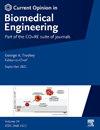Cellular mechanoactivation of antigen-presenting cells and T cells for cancer immunotherapy
IF 4.2
3区 工程技术
Q2 ENGINEERING, BIOMEDICAL
引用次数: 0
Abstract
Cells convert mechanical stimuli into biochemical signals through mechanotransduction, a process that has emerged as a promising approach in cancer immunotherapy. Mechanical forces alter extracellular protein conformation, particularly mechanosensitive ion channels, leading to Ca2+ influx and subsequent cascades of events that modulate cellular function and behavior. Recent discoveries indicate the potential of mechanotransduction as a novel approach for enhancing immune cell activation in cancer treatment modalities. Antigen-presenting cells (APCs) and T cells have become the focus of novel approaches to combat cancer. While current clinical ex vivo methods for APC activation often demonstrate limited efficiency, mechanotransduction techniques demonstrate remarkable potential for dramatically enhancing APC activation, potentially leading to improved therapeutic outcomes. Researchers have explored the mechanosensitivity of T cells to enhance CAR T therapy's specificity and controllability. Additionally, scientists have mechanically activated cancer cells engineered to express priming antigens, which are critical for synthetic Notch (SynNotch) CAR T cell therapy. Among the various mechanotransduction stimuli, fluid shear stress (FSS) and ultrasound have emerged as new and effective approaches for immune cell activation. This article reviews the latest discoveries in the mechanoactivation of APCs, T cells, and engineered CAR T cells utilizing FSS and ultrasound.

肿瘤免疫治疗中抗原提呈细胞和T细胞的细胞机械活化
细胞通过机械转导将机械刺激转化为生化信号,这一过程已成为癌症免疫治疗的一种有前途的方法。机械力改变细胞外蛋白质构象,特别是机械敏感离子通道,导致Ca2+内流和随后的级联事件,调节细胞功能和行为。最近的发现表明,机械转导作为一种增强癌症治疗方式中免疫细胞激活的新方法的潜力。抗原呈递细胞(APCs)和T细胞已经成为对抗癌症的新方法的焦点。虽然目前的临床体外APC激活方法通常效率有限,但机械转导技术显示出显著增强APC激活的显着潜力,可能会改善治疗结果。研究人员探索了T细胞的机械敏感性,以增强CAR - T疗法的特异性和可控性。此外,科学家们已经机械激活了癌细胞来表达启动抗原,这对于合成Notch (SynNotch) CAR - T细胞治疗至关重要。在各种机械转导刺激中,流体剪切应力(FSS)和超声已经成为免疫细胞激活的新的有效方法。本文综述了利用FSS和超声对APCs、T细胞和工程化CAR - T细胞进行机械激活的最新发现。
本文章由计算机程序翻译,如有差异,请以英文原文为准。
求助全文
约1分钟内获得全文
求助全文
来源期刊

Current Opinion in Biomedical Engineering
Medicine-Medicine (miscellaneous)
CiteScore
8.60
自引率
2.60%
发文量
59
 求助内容:
求助内容: 应助结果提醒方式:
应助结果提醒方式:


